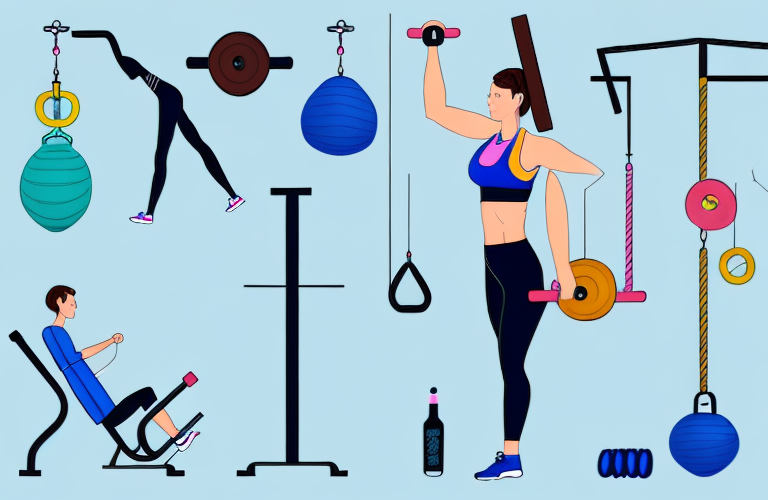When it comes to maintaining good health and preventing chronic diseases, fitness is a crucial component. Regular exercise has numerous benefits for your body and mind, including reducing the risk of heart disease, stroke, diabetes, and some types of cancer, as well as improving bone strength, reducing stress and anxiety, and boosting mood and brain function. In this article, we’ll dive into the importance of fitness for your overall health, the many benefits of exercise, and how to create a personalized fitness plan that works for you.
Understanding the Importance of Fitness for Your Health
Fitness is the state of being physically fit and healthy, through regular exercise, healthy eating, and lifestyle choices. A sedentary lifestyle, combined with unhealthy habits such as smoking, drinking, and poor eating habits can contribute to numerous health problems. Engaging in regular physical activity, on the other hand, can help build and maintain muscle mass, promote weight loss, decrease inflammation throughout the body, improve cardiovascular health, and lower your risk of developing many chronic diseases.
In addition to the physical benefits, regular exercise can also have a positive impact on mental health. Exercise has been shown to reduce symptoms of anxiety and depression, improve mood, and increase self-esteem. It can also provide a sense of accomplishment and boost overall well-being. Incorporating physical activity into your daily routine can be a powerful tool for improving both your physical and mental health.
The Benefits of Regular Exercise for Your Body and Mind
Regular exercise has numerous benefits for your mind and body. Exercise helps to increase your heart rate, pumping more blood to your muscles and improving your cardiovascular fitness. It also helps to reduce inflammation in your body, which is often associated with chronic conditions such as heart disease, diabetes, and arthritis. Exercise also helps to strengthen your muscles and bones, reducing your risk of injury and falls. Mentally, regular exercise has been shown to boost mood, reduce symptoms of depression and anxiety, and improve cognitive function and memory.
In addition to the physical and mental benefits mentioned above, regular exercise can also improve your sleep quality. Studies have shown that exercise can help you fall asleep faster and stay asleep longer, leading to better overall sleep quality. Exercise can also help to regulate your circadian rhythm, which is your body’s internal clock that controls your sleep-wake cycle. By establishing a regular exercise routine, you can improve your sleep habits and feel more rested and energized throughout the day.
How to Create a Personalized Fitness Plan that Works for You
To create a personalized fitness plan, consider your fitness goals, your preferred types of exercise, and any physical limitations you may have. A fitness plan should include a mix of cardiovascular exercise, strength training, and flexibility exercises such as yoga or stretching. Start slowly, gradually increasing the frequency and intensity of your workouts over time. Consider working with a personal trainer or exercise specialist to help you create an effective and safe plan.
It’s important to also consider your schedule and lifestyle when creating a fitness plan. If you have a busy schedule, try to find ways to incorporate exercise into your daily routine, such as taking the stairs instead of the elevator or going for a walk during your lunch break. Additionally, make sure to choose activities that you enjoy and that fit your personality. If you prefer group activities, consider joining a fitness class or sports team. If you prefer solo activities, try running or cycling.
Remember to also prioritize rest and recovery in your fitness plan. Allow your body time to rest and recover between workouts, and make sure to get enough sleep each night. Proper nutrition is also important for fueling your workouts and aiding in recovery. Consider consulting with a registered dietitian to help you create a balanced and healthy meal plan.
The Top 5 Exercises for a Full-Body Workout
When it comes to a full-body workout, it’s important to engage in exercises that work multiple muscle groups at once. The top 5 exercises for a full-body workout include squats, lunges, push-ups, pull-ups, and planks. These exercises can be modified to suit your fitness level and can be done with or without equipment.
In addition to these exercises, it’s also important to incorporate cardiovascular activities into your workout routine. Activities such as running, cycling, or swimming can help improve your overall fitness and endurance. Aim for at least 30 minutes of moderate-intensity cardio exercise, three to four times a week, to complement your full-body strength training routine.
How to Incorporate Cardiovascular Exercise into Your Fitness Routine
Cardiovascular exercise is essential for promoting heart health and burning calories. However, it’s important to find types of cardio that you enjoy, whether it’s running, swimming, cycling, or dancing. Aim for at least 150 minutes of moderate-intensity cardio per week, or 75 minutes of vigorous-intensity cardio.
In addition to finding enjoyable types of cardio, it’s also important to mix up your routine to prevent boredom and plateauing. Try incorporating interval training, where you alternate between high-intensity bursts and lower-intensity recovery periods. This can help increase your endurance and burn more calories in a shorter amount of time.
Another way to incorporate cardiovascular exercise into your routine is to make it a social activity. Join a group fitness class or find a workout buddy to keep you motivated and accountable. Not only will you get the benefits of cardio, but you’ll also have fun and build relationships with others who share your fitness goals.
The Importance of Strength Training and Building Muscle Mass
Strength training is important for building muscle mass, which helps to increase your metabolism and burn more calories at rest. Additionally, strength training can help to improve your bone density, reducing your risk of osteoporosis and fractures. Aim to strength train 2-3 times per week, targeting all major muscle groups in your body with exercises such as squats, deadlifts, bench presses, and lunges.
Another benefit of strength training is that it can help to improve your overall physical performance and reduce your risk of injury. By strengthening your muscles, you can improve your balance, stability, and coordination, which can translate to better performance in sports and other physical activities. Additionally, strength training can help to correct muscle imbalances and weaknesses, which can reduce your risk of developing injuries.
Strength training can also have a positive impact on your mental health. Studies have shown that regular strength training can help to reduce symptoms of anxiety and depression, and improve overall mood and self-esteem. This may be due in part to the release of endorphins during exercise, which can help to boost your mood and reduce stress levels.
How to Improve Flexibility and Balance with Yoga and Stretching Exercises
Flexibility and balance are important components of fitness but are often overlooked in traditional workout routines. Incorporating yoga or stretching exercises into your routine can help improve your flexibility, balance, and coordination and reduce your risk of injury. Consider attending a yoga or stretching class, or try incorporating a few stretches into your cool-down routine after a workout.
Additionally, practicing yoga and stretching exercises can also have mental health benefits. The focus on breathing and mindfulness during these exercises can help reduce stress and anxiety, improve mood, and promote relaxation. So not only will you be improving your physical health, but your mental health as well.
Tips for Staying Motivated and Consistent with Your Fitness Goals
Staying motivated and consistent with your fitness goals can be challenging. To stay motivated, consider setting specific and measurable goals, tracking your progress, rewarding yourself for your successes, and finding a workout buddy or joining a fitness community for support.
Another helpful tip for staying motivated and consistent with your fitness goals is to mix up your workouts. Doing the same routine every day can become monotonous and lead to boredom. Try incorporating different types of exercises, such as strength training, cardio, and yoga, to keep things interesting and challenging. Additionally, make sure to give yourself rest days to allow your body to recover and prevent burnout.
Common Mistakes to Avoid When Starting a New Fitness Routine
Starting a new fitness routine can be overwhelming and challenging. Some common mistakes to avoid include setting unrealistic goals, not warming up or cooling down, not incorporating rest days, or comparing yourself to others. Remember to start slow, listen to your body, and make adjustments as needed.
Another common mistake to avoid when starting a new fitness routine is not fueling your body properly. It’s important to eat a balanced diet that includes enough protein, carbohydrates, and healthy fats to support your workouts and help your body recover. Additionally, make sure to stay hydrated by drinking plenty of water throughout the day and during your workouts.
How to Properly Fuel Your Body Before and After Exercise
Fueling your body properly before and after exercise is essential for optimal performance and recovery. Carbohydrates provide your body with energy during exercise, while protein is important for muscle repair and recovery. Aim to eat a balanced meal with carbohydrates and protein 2-3 hours before a workout, and refuel with a snack or meal within 30 minutes to an hour after exercise.
In addition to carbohydrates and protein, it’s also important to stay hydrated before, during, and after exercise. Drinking water helps regulate your body temperature and prevent dehydration, which can lead to fatigue and muscle cramps. Aim to drink at least 8-10 glasses of water per day, and drink an additional 16-20 ounces of water 2-3 hours before exercise. During exercise, drink 7-10 ounces of water every 10-20 minutes, and after exercise, drink at least 16-24 ounces of water for every pound of body weight lost during exercise.
The Link Between Fitness and Mental Health: Reducing Stress, Anxiety, and Depression
Exercise has numerous benefits for your mental health, including reducing stress, anxiety, and depression. Exercise can help to release feel-good hormones such as endorphins and serotonin, improving your mood and reducing anxiety. Additionally, regular exercise has been shown to improve sleep quality, reduce fatigue, and boost self-confidence and self-esteem.
Furthermore, exercise can also help to improve cognitive function and memory. Studies have shown that regular physical activity can increase the size of the hippocampus, the part of the brain responsible for memory and learning. This can lead to improved cognitive function and a reduced risk of cognitive decline in older adults.
In addition to the mental health benefits, exercise can also have a positive impact on physical health. Regular exercise can help to reduce the risk of chronic diseases such as heart disease, diabetes, and certain types of cancer. It can also improve overall physical fitness, including strength, endurance, and flexibility.
The Importance of Rest and Recovery in a Balanced Fitness Routine
Rest and recovery are just as important as exercise when it comes to maintaining good health and preventing injury. Your body needs time to rest and recover after workouts, so it’s important to take rest days, get enough sleep, and listen to your body to avoid overtraining or burnout.
In addition to taking rest days and getting enough sleep, there are other ways to promote rest and recovery in your fitness routine. One effective method is incorporating stretching and foam rolling into your post-workout routine. This can help to reduce muscle soreness and improve flexibility. Another way to aid in recovery is through proper nutrition, such as consuming protein and carbohydrates after a workout to help repair and rebuild muscle tissue. By prioritizing rest and recovery, you can improve your overall fitness and prevent injury in the long run.
How to Track Your Progress and Celebrate Your Achievements
Tracking your progress is essential for staying motivated and consistent with your fitness goals. Consider using a fitness tracker or journal to record your workouts, track your progress, and celebrate your achievements along the way.
Another way to track your progress is by taking progress photos. Take a photo of yourself at the beginning of your fitness journey and then take progress photos every few weeks or months. This will allow you to visually see the changes in your body and can be a great source of motivation. Additionally, don’t forget to celebrate your achievements along the way. Whether it’s hitting a new personal record or reaching a weight loss milestone, take the time to acknowledge and reward yourself for your hard work and dedication.
Finding Support and Community on Your Fitness Journey
Finding support and community can help you stay motivated and consistent with your fitness goals. Consider joining a fitness class, finding a workout buddy, or joining a fitness community online or in person.
Research has shown that having a support system can greatly improve your chances of achieving your fitness goals. Not only can they provide encouragement and accountability, but they can also offer helpful tips and advice. Additionally, being part of a community can make exercising more enjoyable and less intimidating. So don’t be afraid to reach out and connect with others who share your passion for fitness!
Conclusion
With regular exercise and healthy habits, you can maintain good health and reduce your risk of chronic diseases. Creating a personalized fitness plan that includes a mix of cardiovascular exercise, strength training, and flexibility exercises can help you reach your fitness goals and stay motivated along the way. Remember to fuel your body properly, take rest days, and find support and community to help you stay on track.
It’s important to note that exercise not only benefits physical health, but also mental health. Regular exercise has been shown to reduce symptoms of anxiety and depression, improve mood, and increase self-esteem. Additionally, incorporating mindfulness practices such as yoga or meditation into your fitness routine can further enhance these mental health benefits.
Finally, it’s never too late to start exercising and improving your health. Even small changes, such as taking a daily walk or doing a few minutes of stretching each day, can have a positive impact on your overall well-being. So, take the first step towards a healthier lifestyle today and reap the benefits for years to come.










